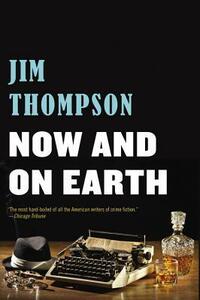Take a photo of a barcode or cover
I purchased a paperback copy of this book because Stephen King wrote the introduction. I got so caught up in the introduction that I just kept reading. It’s a good story about day-to-day life with all its complications, obligations, and humiliations. But it’s not depressing. It reminded me a lot of Tabitha King’s novel, “The Book of Reuben”.
lighthearted
fast-paced
Maybe my dissertation made me sweet on it, but this novel provides a dark and compelling portrait of the WWII American homefront, but with fewer Victory gardens and more Tijuana abortions.
Thompson's first novel has many of the hallmarks of his later work, the focus on the underclass and how they despise their so called superiors, but it's hardly what I would call a crime novel. It's autobiographical, exploring themes of family, absent fathers, and the alcoholism that ran through his family and his class as well, painting a horrific picture of life in America 100 years ago. Thompson's insight has never been greater, Dillon's (Thompson as a character) father acknowledging that class is everything when he said that he succeeded as a lawyer largely because of his size and confident speaking voice--usually how the inferiors in the upper middle class thrive--but that he was always scared, just scared enough to be desperate always to win, knowing he was under more scrutiny due to his impoverished origins.
It's heavy stuff to see generational trauma portrayed so well in 1942, at least 75 years before the term was coined. Dillon mentions a Heinlein story in which a man appears to be delusional and suffers a persecution complex, which turns out in the end to be an actual conspiracy by all who know him. Dillon began to feel similarly when a potentially life changing criminal enterprise is foiled, later when he is screwed over on a stock deal, though he admits then that he never wanted anyone's help and always wanted to be alone, the last refuge of the alcoholic writer (his father had said that once one feels walled in, some vice would ensue, chastising his son not for his alcoholism but for failing to realize that his father had a food addiction; both had no ability with relationships or caring for a family).
Stephen King lauds Thompson for his unflinching and balance examination of the alienated mind--like another Thompson, one Hunter, which makes me think we've always needed a punk band called the Thompsons, a triple entendre invoking also the machine gun--though we should discount a hack establishment tool like King, a man who secretly despises and fears the lower classes from his bubble of upper middle class wealth. He said Thompson was unrelenting and would never stop. The shame is that Thompson died very young in 1969 and King didn't stop 45 years ago.
It's heavy stuff to see generational trauma portrayed so well in 1942, at least 75 years before the term was coined. Dillon mentions a Heinlein story in which a man appears to be delusional and suffers a persecution complex, which turns out in the end to be an actual conspiracy by all who know him. Dillon began to feel similarly when a potentially life changing criminal enterprise is foiled, later when he is screwed over on a stock deal, though he admits then that he never wanted anyone's help and always wanted to be alone, the last refuge of the alcoholic writer (his father had said that once one feels walled in, some vice would ensue, chastising his son not for his alcoholism but for failing to realize that his father had a food addiction; both had no ability with relationships or caring for a family).
Stephen King lauds Thompson for his unflinching and balance examination of the alienated mind--like another Thompson, one Hunter, which makes me think we've always needed a punk band called the Thompsons, a triple entendre invoking also the machine gun--though we should discount a hack establishment tool like King, a man who secretly despises and fears the lower classes from his bubble of upper middle class wealth. He said Thompson was unrelenting and would never stop. The shame is that Thompson died very young in 1969 and King didn't stop 45 years ago.
An interesting book that transports the reader to an unusual and overlooked place and time: James Dillon is a young father and failed writer battling alcoholism while struggling to hold down a job at an airplane factory in San Diego in the early days of WWII. The book definitely has a bit of "first book" syndrome, Jim Thompson seems to have included all sorts of autobiographical and near-autobiographical details, and the book is packed to the rafters, with everything from flashbacks to working as a bellhop in Prohibition-era Oklahoma and the working out of lingering childhood psychological issues (including an imagined dialogue with a dead father) to a synopsis of a Robert Heinlein's 1941 short story "They," as well as pages dedicated to the quotidian frustrations of working in a factory (with more details about parts management systems than you would ever have expected to (or hoped to) ever see in a novel).
But the devil is in these details, the depiction of life on the edge of ruin and madness is very rich and believable. The novel comes most to life in the neo-realist depiction of the frustrations, squalor, and occasional moments of joy in Dillon's family life, it is his position as a father, husband, and son which makes this stand out from the pack. The Dillon family is struggling, always on the verge of a crack-up, and living from paycheck-to-paycheck and meal-to-meal. There's everything from sexual tensions to what we would now definitely consider to be child abuse on display, and this feels very true and terrifying, while retaining a much-needed glimmer of hope.
This book can be occasionally difficult for a contemporary reader to follow, the milieu is a bit distant and, and the writer frequently uses euphemisms, elisions, and suggestion in the place of detailing subjects that were still quite taboo at the moment, like prostitution, abortion, and illegal drugs, meaning you have to read between the lines. Overall a very satisfying read that doesn't amaze, but does shed life on a vanished world and makes me want to read more of Thompson's work.
But the devil is in these details, the depiction of life on the edge of ruin and madness is very rich and believable. The novel comes most to life in the neo-realist depiction of the frustrations, squalor, and occasional moments of joy in Dillon's family life, it is his position as a father, husband, and son which makes this stand out from the pack. The Dillon family is struggling, always on the verge of a crack-up, and living from paycheck-to-paycheck and meal-to-meal. There's everything from sexual tensions to what we would now definitely consider to be child abuse on display, and this feels very true and terrifying, while retaining a much-needed glimmer of hope.
This book can be occasionally difficult for a contemporary reader to follow, the milieu is a bit distant and, and the writer frequently uses euphemisms, elisions, and suggestion in the place of detailing subjects that were still quite taboo at the moment, like prostitution, abortion, and illegal drugs, meaning you have to read between the lines. Overall a very satisfying read that doesn't amaze, but does shed life on a vanished world and makes me want to read more of Thompson's work.
If they accumulate a catalog of work large enough, every author/artist will have what are considered to be "lesser works." And while occasionally, there's a hidden gem buried in there or something that appeals specifically to the client, they're called "lesser works" for a reason.
I know a lot about Jim Thompson's life and works but I didn't know that Now And On Earth is 1. a semi-autobiography and 2. his very first book. It shows. We have an author with talent who doesn't quite know what to do with it so he retells his family story in fictional form (Thompson did this more effectively in Bad Boy.).
And it's just not an interesting story. For the first part, I thought Thompson was trying to do some sort of symbolic retelling of a man dwelling in hell because Dillon, his main character, certainly seemed like he was in it, being stuck in a low paying job he hates while trying to support a family that he also seems to hate. But unlike other great Thompson novels, there's not the ribbon of crime to tie a bow on this story. There are some criminal elements but it's not really what he's emphasizing and when it comes together near the end, I was too exhausted to care.
While has moments of existential greatness, particularly in one scene with Dillon and his daughter that I won't forget (as well as another dig at his father, which seems to be Thompson's favorite thing), there's just not much here to hold the reader's attention. The main character is a tool and not an interesting one at that who hates everything, somewhat understandably but not enough to make him an interesting read. This is only for Thompson completists such as myself.
I know a lot about Jim Thompson's life and works but I didn't know that Now And On Earth is 1. a semi-autobiography and 2. his very first book. It shows. We have an author with talent who doesn't quite know what to do with it so he retells his family story in fictional form (Thompson did this more effectively in Bad Boy.).
And it's just not an interesting story. For the first part, I thought Thompson was trying to do some sort of symbolic retelling of a man dwelling in hell because Dillon, his main character, certainly seemed like he was in it, being stuck in a low paying job he hates while trying to support a family that he also seems to hate. But unlike other great Thompson novels, there's not the ribbon of crime to tie a bow on this story. There are some criminal elements but it's not really what he's emphasizing and when it comes together near the end, I was too exhausted to care.
While has moments of existential greatness, particularly in one scene with Dillon and his daughter that I won't forget (as well as another dig at his father, which seems to be Thompson's favorite thing), there's just not much here to hold the reader's attention. The main character is a tool and not an interesting one at that who hates everything, somewhat understandably but not enough to make him an interesting read. This is only for Thompson completists such as myself.
contains an introduction by stephen king with a great quote about jim thompson:
"the literature of a healthy society needs proctologists as much as brain surgeons"
this wasn't thompson's usual noir, but rather a semi-autobiographical novel about
old school family, i.e. extended, all living in the same house, often drinking,
sometimes fighting (oddly enough, usually when NOT drinking), any barely getting
by on one salary from a horrible job, but with a deep sense of responsibility
despite many setbacks. i.e. "heartwarming" in parts. but ultimately there wasn't
much of a story here, just a slice of life in a different time.
"the literature of a healthy society needs proctologists as much as brain surgeons"
this wasn't thompson's usual noir, but rather a semi-autobiographical novel about
old school family, i.e. extended, all living in the same house, often drinking,
sometimes fighting (oddly enough, usually when NOT drinking), any barely getting
by on one salary from a horrible job, but with a deep sense of responsibility
despite many setbacks. i.e. "heartwarming" in parts. but ultimately there wasn't
much of a story here, just a slice of life in a different time.



